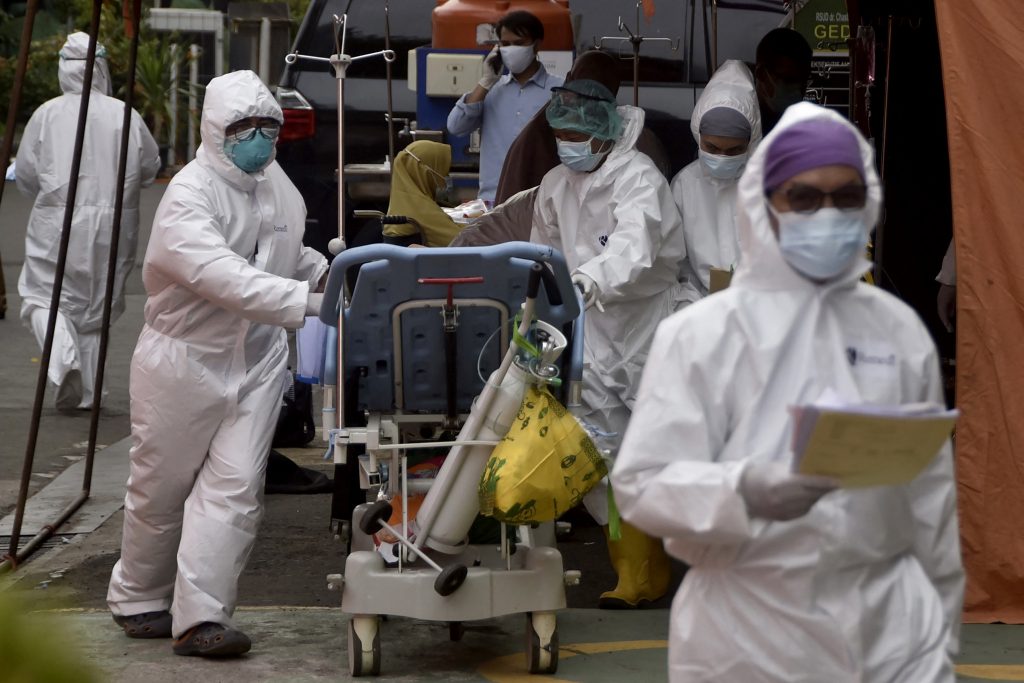
Is Indonesia the Next India or Brazil? The Dangerous Spread of COVID-19 and Misinformation Across the Archipelago

*all authors contributed equally to this publication (Ryan Sutherland, MPH, and Nur Afiaty)
Nur Afiaty is a graduate student in Public Health Sciences at Gadjah Mada University (UGM), Indonesia, and is a recipient of the prestigious Endowment Fund for Education (LPDP) scholarship from the Republic of Indonesia. She is passionate about improving the health of Indonesian youth, researching themes that unite her interests in development, community empowerment, and education. She has presented her work internationally, receiving an award for the best poster presented at the Asia Pacific Academic Consortium for Public Health Conference (APACPH) Tokyo, Japan, for her research on preventing the transmission of dengue in Indonesia. She is also actively involved in smoking prevention and non-communicable disease research in Eastern Indonesia while serving as a Clean and Healthy Ambassador at Hasanuddin CONTACT, and presently works for Octopus Indonesia, a startup that helps improve the standard of living and health of waste pickers.
As the world’s fourth most populated country with a population that exceeds 270 million, Indonesia has reported over 2.7 million COVID-19 infections and 70,000 deaths since the pandemic began. Despite daily infections dipping below 5,000 in May, the daily death toll and infection rates recently risen again, exceeding those of India and Brazil, two of the countries that have been hardest hit by the pandemic.
Recent surges have exposed the vulnerability of the Indonesian healthcare system, overwhelming overburdened medical facilities that have struggled to stay afloat since the beginning of the pandemic. With cases exploding exponentially in megacities like Jakarta and spread across the farthest reaches of the archipelago, often affecting impoverished communities hardest, many experts wonder if Indonesia could be the next India or Brazil.
With one of the worst vaccination rates among ASEAN countries and worldwide, hovering at just 6%, and a severely limited testing infrastructure that has the capacity to perform only 71 tests per 1,000 individuals, Indonesia continues to face significant challenges in controlling the spread of the virus and accurately tracking its devastation, vastly underestimating the virus’ impact and spread.
Many of Indonesia’s challenges stem from distributional issues that are magnified by the archipelagic nation’s vast geographical spread across over 17,000 islands. As viral epicenters, cities like Jakarta and Bali have shown higher rates of vaccination than the rest of the country, but rates still remain low. Community vaccination efforts in Indonesia’s rural corners, in regions like Aceh, Bengkulu, Jambi, and West Kalimantan, places with ill-equipped healthcare facilities and few providers, have largely been inadequate.
Furthermore, according to the Indonesian Ministry of Health, the supply of vaccines received as of July 2021 was only 151.9 million doses, 30% of the 462 million total doses the nation requested. Indonesia is scheduled to receive an additional 80 million doses of the vaccine in September, October, and December 2021, prioritizing distributing doses to provinces with high rates of disease a low vaccine availability and uptake, but this still doesn’t match the number of vaccine doses that are needed to combat the virus’ spread.
Controversially, several articles have recently been published highlighting wealthier Indonesians’ plans to engage in vaccine tourism, travelling to places like Singapore or the United States to receive their doses to avoid the wait they would face in Indonesia or to have the ability to elect vaccines like Pfizer that are presently not available in Indonesia. Many human rights activists have called on politicians to recognize that the deaths that result from vaccine delays will largely be borne by impoverished Indonesians. With over 25 million people in Indonesia living on less than $1 per day, poverty is directly linked to health disparities worsened COVID-19 health outcomes.
Beyond testing limitations, Indonesia lags far behind neighboring nations in its ability to treat hospitalized cases of COVID-19, noting an extreme lack of ventilators and oxygen. Luhut Binsar Pandjaitan, the minister responsible for coordinating Indonesia’s COVID-19 response, noted that over 1,000 ventilators, 36,000 tons of oxygen, and over 10,000 concentrators had been purchased from Australia and Singapore since the uptick in infections since mid-July. But this might not be enough. Despite the rise in daily deaths and cases, experts warn that Indonesia hasn’t yet reached its peak.
As the Delta variant ravages archipelago, becoming the dominant strain, Indonesia is fighting against another virus: misinformation. According to data from the Ministry of Communication and Information of the Republic of Indonesia (Kemkominfo), 1,670 COVID-19 hoaxes were discovered between January 23 and June 25, 2021, noting that 3,690 hoaxes were scattered across various social media platforms including Facebook, Twitter, YouTube, and Instagram. The low vaccination rate can partially be attributed to conspiracy theories that have widely perpetuated on the internet, sparking government ministers to demand misinformation be filtered to stem public mistrust. One of the most prominent conspiracy theories that has spread widely is Dr Lois Owien’s claim that the recent spike in COVID-19 mortality was in fact due to heavy metals found in the vaccine, weakening natural immunity and worsening the symptoms of vaccinated individuals who have contracted the virus. Despite attempts from experts to reassure the public that these claims are baseless, they have widely circulated on social media, causing widespread vaccine hesitancy.
Furthermore, many have called into question the efficacy of the Sinovac vaccine—the most widely available vaccine in the archipelago—after multiple cases of fully inoculated healthcare workers died after contracting the virus. The Indonesian government’s move to provide over 1.47 million Moderna booster shots to frontline healthcare workers, many of whom had already received the Sinovac vaccine, has also damaged public trust in available vaccines.
Overall, Indonesia is facing an urgent public health crisis of unknown proportions as the virus continues to sweep across the nation. In addition to battling community spread, Indonesian public health officials have faced an uphill battle combatting public misinformation, attempting to rebuild trust in evidence-based practices and promoting vaccination despite hesitancy. While India and Brazil have often been viewed as two of the nations that have suffered the worst impacts of the virus globally, Indonesia’s troubling growing daily death rate, its ill-equipped healthcare system, the plague of widespread misinformation, and its limited access to vaccines is worrisome, potentially making it the newest global epicenter for viral spread. Only time will tell.

HPHR.org was designed by ComputerAlly.com.
Visit HPHR’s publisher, the Boston Congress of Public Health (BCPH).
Email communications@bcph.org for more information.

Click below to make a tax-deductible donation supporting the educational initiatives of the Boston Congress of Public Health, publisher of HPHR Journal.![]()